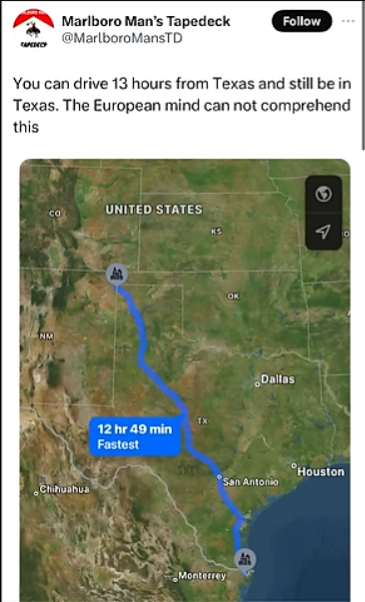this post was submitted on 16 Apr 2024
575 points (86.8% liked)
Funny
7002 readers
1318 users here now
General rules:
- Be kind.
- All posts must make an attempt to be funny.
- Obey the general sh.itjust.works instance rules.
- No politics or political figures. There are plenty of other politics communities to choose from.
- Don't post anything grotesque or potentially illegal. Examples include pornography, gore, animal cruelty, inappropriate jokes involving kids, etc.
Exceptions may be made at the discretion of the mods.
founded 2 years ago
MODERATORS
you are viewing a single comment's thread
view the rest of the comments
view the rest of the comments

The European mind just cannot comprehend such distances
Oh it's a scenic ocean view instead of desert followed by dirty roads. I wonder which one should I pick.
I mean even discounting the view, I've of them is in Texas, yuck
Sweden is like a long penis that some Europeans can comprehend.
I'm conflicted is comparing a whole country travel distance to a state the same or I'm missing something? Genuinely curious. If we are talking about size of just a state do we Europeans have anything close to it?
To be honest in my head US state == country in Europe and USA == EU. Both are unions of states - one of them is just younger and less binding.
Similar, absolutely, but there's a LOT more uniformity to states in the US than member states of the EU. Every state speaks English, every state has the same laws generally speaking for about 90% of things, etc.
Yeah, that's what I meant by binding. Just wanted to say that it is not really surprising that the majority of Europeans in these comments compare US states to EU countries.
Us is nothing but a bunch of smaller states that formed under a united government.
Not much unlike the entire principle of EU
What no... What are you talking about? EU is not even close to the government structure of the US. Starting that each EU country has their own military, and the EU president has absolutely no power on each of the EU members military.
I must have missed the part where I said the structure is identical.
So... what are YOU talking about?
"not much unlike"? They are both nothing alike, except that they are some sort of union.
I mean, if you say that in real life to anyone who is half aware of how the government works, they would laugh at you.
Why don't you quote the entire sentence instead of cutting it off in the middle.
You're so far up your own ass. So let me help you.
"Not much unlike the entire principle of EU"
The principle of United States. And the European Union. Is the same.
Multiple smaller states that each have their own laws. Bound by a greater entity that has laws EVERYONE has to follow.
Each state have representatives to the greater union where they legislate and create policies concerning the entire union.
Sure dude, EU and US, same principle, same as united nations, united airlines and IUPAC. Same principle, they are a union of things, if you mean that as "principle", sure.
EU doesn't have rules that everyone has to follow, they have agreements, that are often very specific between nations. UK was part of the EU with their own currency for example. So no, it's not the same type of union, unless you simplfiy it to "union of things"which of course is the same principle.
Also any member of the EU can leave unilaterally (like the UK), not so much for the US. I don't think they follow the same principle, again, unless you think of it just as a "union of things"
EU definatly have rules everyone has to follow. They're often called "directives" and are not optional. E.g. the 2021 ban on single use plastic cuttlery.
That was decided by EU. Members then have to implement it and reach that goal within a certain timeframe.
EU also decide what can and can't be imported into EU.
True, but my point is that if a country decides not to follow one of the directives, they can just leave if they want, they are agreements that they want to be part of, they are not merely imposed by EU. Nothing like the US and their federal government.
This is like saying that marriage and a double match of tennis are the same type of union or follow the same principle, no, they are not.
No. It's not like your ridiculous example. Not even close.
Exactly, it's a ridiculous example because it sounds just as ridiculous as saying US and EU are in principle the same type of union.
I was being hyperbolic with my last sentence so you can see how ridiculous your statement sounds to me.
I didn't say they're in principle the same union.
I said the principle is the same.
The principle of multiple smaller states adhering to a larger entity that can enact rules over everyone, and then send representatives to this entity.
I can see how ridiculously bad your reading comprehension is
Texas is one state.
One state, with their own unique state legislation, with a federal legislation on top of that.
Not unlike one member country of EU. With their own legislation, with EU legislation on top of that.
Same shit different names. Except EU members actually have the power to secede if they want to.
I genuinely don't know this, does the eu collect taxes from member nations and redistribute it to poorer nations or in natural disasters?
Members have to pay "taxes" to be part of EU, yes.
Members can also apply for funds from EU for various projects, even companies in member countries can apply for funds from EU in cases.
And as far as I'm aware, EU does help Members with funding for emergancy responses to natural disasters